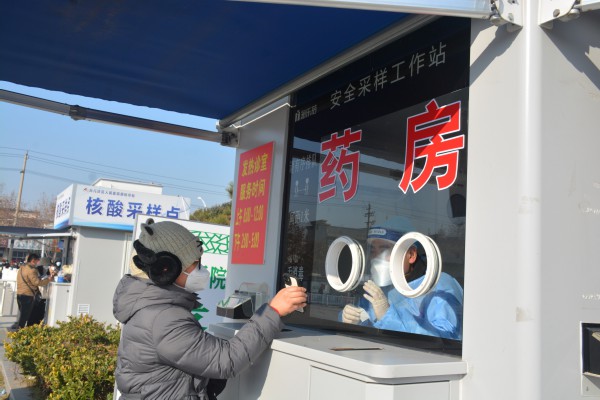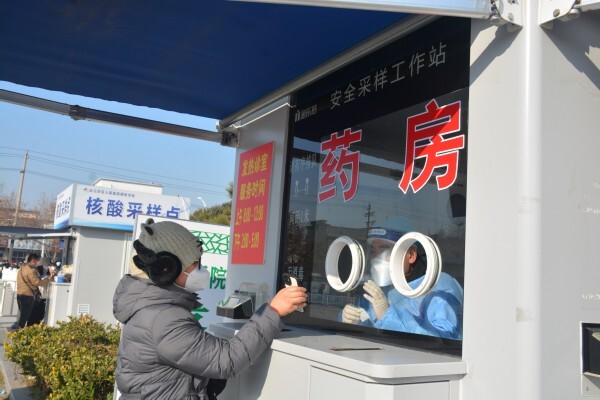
In Zaozhuang city of Shandong province, some testing sites have been working as temporary fever clinics since Sunday. [Photo provided to chinadaily.com.cn]
The Suzhou government in Jiangsu province has been praised recently by many Chinese netizens for being the first city in the country to transform nucleic acid sampling stations into fever clinics, which can provide fever and pain medications to people in need.
Compared with those queuing for hours at hospitals, people visiting roadside fever clinics can finish the whole medical process in about 10 minutes. They can use their health insurance to get fever and pain medications, which are in short supply at the moment across the country.
Cao Qiaolu, deputy director of the residential community health management center of Suzhou's Gusu district, said that the fever clinics enable residents to get help within a 15-minute walking distance.
"The clinics are equipped with doctors and pharmacists," she said. "Oxygen machines and health insurance equipment are also provided."
As of Sunday, Suzhou had established 1,035 roadside fever clinics.
Neighboring city Wuxi has also established 1,519 similar fever clinics.
According to the city's health commission, the fever clinics were renovated from nucleic acid sampling stations and empty rooms provided by local residential community committees.
As of Saturday, more than 16,000 people have visited the fever clinics, and more such clinics are under renovation and will be put into use soon.
Jiangsu's capital Nanjing has also rolled out similar measures to relieve medication pressures.
Nanjing's Jiangning district has sent 16 buses upgraded to treat fever to residential communities and local companies since Monday. All of its 154 residential community medical centers have opened fever clinics.
Each patient visiting the buses will get three days worth of medication, avoiding the need to line up at a hospital.
Zhang Ping, a 68-year-old retired government worker in Nanjing, said that she had to queue for three hours to get ibuprofen from a pharmacy on Saturday.
"Many friends said they cannot get fever syrup for their children from pharmacies and it really tortured them," she said. "But things are getting better as more fever medicine has been put on the market."
Since Monday, Nanjing has provided 2 million fever medicine pills to local residents. A customer may purchase six pills each time at one of the 153 pharmacies selling fever medicine across the city.
Similar measures have also been rolled out in cities of Shandong province. In Taierzhuang district of Zaozhuang, some testing sites have also been working as temporary fever clinics since Sunday.
Anti-inflammatory ibuprofen is available at 1.44 yuan (20 cents) for 10 tablets.
Shandong Health Commission released a notice on Sunday calling for medical service providers in both urban and rural areas to coordinate resources to cover residents' medical needs.
Measures suggested by the commission included upgrading testing booths to fever clinics and building a diagnosis and treatment medical service base that a resident can reach within 15 minutes.
Chengwu county of Heze has upgraded 56 testing stations into fever treatment service stations to provide diagnosis and medicine. Each station has one doctor and one nurse on duty, and keeps medicines in stock.
The service stations are being set up to better provide medical services to residents, as more people are expected to return home with the approach of the Lunar New Year holiday, said Ping Yuhua, head of Chengwu County People's Hospital.
At a temporary fever clinic in Huaiyin district of Jinan, it takes a resident around 10 minutes to see a doctor and get medicine.
The testing site had already delivered some basics, making the upgrade easier than building a new fever clinic, said Lyu Qiang of the community medical service center on Middle Dahuaishu subdistrict in Huaiyin district.
"We spent a day and a half upgrading a testing booth to a fever clinic," Lyu said.
The temporary street fever clinic has a doctor and a pharmacist. In addition, it has been integrated into the city's medical insurance system.






